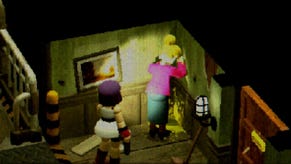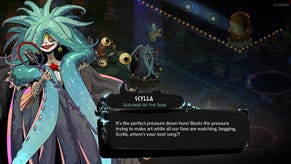Wot I Think: The Testament Of Sherlock Holmes
Holmes, Sweet Holmes
I love all things Sherlock, from Arthur Conan Doyle's literary adaptations of Jeremy Brett's fascinating life and times to Humpledink Bundlesnatch’s modern man interpretation of the great detective. Actually, I'm not keen on the Guy Ritchie version , so to be correct, let’s say I love most things Sherlock. Frogwares’ adventures have been a mixed bag, mostly coffee creams, but I’ve found some of the later ones entertaining enough, if seriously flawed. How does The Testament of Sherlock Holmes play out though? Here’s wot I deduced.
We find ourselves in the beautifully appointed and yet cluttered rooms of 221b Baker Street, home to the gaunt figure and brilliant mind of Sherlock Holmes and his pet doctor, John Watson. The latter reads the morning paper and occasionally sips from a freshly brewed cup of tea. Holmes reclines on the couch sighing dramatically and occasionally eating a bag of drugs.
Watson: I say, Holmes, have you seen this? The Globe is carrying the news of our latest triumph and confound it all if they haven’t muddled the details something terrible.
Holmes: I shall never understand why you pay so much attention to the scurrilous scribblings of the newsmen. Their every word is driven by agenda, the desire for profit and a craven jealousy.
Watson: They praise you greatly but do not recognise my own role in the matter at all.
Holmes: Hmph. Were you there? I barely noticed.
Watson: Now, Holmes, that is most unkind!
Holmes: It was an exceedingly silly case and you are better not to be remembered for it.
Watson: But I am remembered for nothing.
Holmes: You? Remembered for nothing? Why, you are the famous chronicler of my deeds, Watson. Speaking of which, what poetic license have you taken in the naming of this latest adventure?
Watson: The Testament of Sherlock Holmes.
Holmes: Well, aren’t you the bloody great dramatist.
Watson sips his tea. His moustache bristles in annoyance.
As it turns out, The Testament is a very dramatic tale, with suspicion and division between Holmes and Watson. The plot draws on elements of the original stories, and there are many references to past cases, both Frogwares’ own and those of Doyle. The plot dutifully twists and turns, occasionally managing to spring a surprise or two, but the case itself is a much more conventional detective mystery than the concept suggests.
In short, Holmes is acting oddly, even more oddly than usual - avoiding contact with Scotland Yard, lying blatantly and concealing evidence from his friend. As the bodies pile up, Watson becomes convinced that Holmes is hiding some sinister secret. To make matters worse, Sherlock seems more than willing to break the one rule of the world’s second greatest detective, showing an eagerness to bump off suspects and witnesses alike.
Watson: It really was a terrible affair, all told, perhaps the most morbid and gruesome escapade of our career together.
Holmes: Really? I did not notice.
Watson: You didn’t notice the body parts, the mutilated corpses and the extreme close ups of graphic wounds that we were obliged to pore over with a magnifying glass and a pair of tweezers in hand? It was a veritable horror show!
Holmes: You are very squeamish for a man who professes to be a war veteran and a doctor.
Watson: Professes to be? This really is too much, Holmes. You would cast aspersions on my character after the dreadful things that you yourself are suspected of?
Holmes: There are means and ends, Watson, surely a pragmatist and man of science can understand that. It is not a difficult concept to grasp. I have done nothing that I would not do again, and nothing that was not necessary to secure the safety of the Kingdom.
Watson: Even so, do you not regret some of your more…devious and devilish actions?
Holmes: I regret…
Holmes casually injects cocaine into his eyeball.
There are a lot of dead people in this game. Not as many as there are in a Total War game but definitely more than in most adventure games. Despite that, this isn’t grimdark Holmes, which is a damn good thing. While it is necessary to perform the odd autopsy and to search for clues among the half-eaten bodies of a dog and a man, there’s a rich vein of comedy running through the game as well. Some of it is intentional, some of it probably isn’t, but the chortles are only possible thanks to the splendid characterisation.
While not all of the dialogue and voice acting is on a par, at their best the writing and performances are excellent. Holmes and Watson play off each other, capturing the conflict and symbiosis of mind and heart. The comic aspects of the central relationship are never drawn as broadly as in the BBC’s current Sherlock, but there are recurring jokes, almost all of them at Watson’s expense. Holmes’ voice actor fits the part particularly well. Standing over a corpse and preparing to delve into its guts in search of clues, he is admonished by Watson. “This place is filthy and have you even performed a post-mortem before?” The reply is clipped and cutting: “I’m a quick learner. Now, pass me the bone saw.”
Holmes: I must admit, I found the whole experience to be incredibly satisfactory. My wits were engaged by the alarming number of puzzling locks that littered our path, some requiring knowledge of chess, others of logic or numeracy. I was somewhat surprised that some miscreant hadn’t secured a stash of evidence behind a locked door with a Killer Sudoku etched into the lock.
Watson: That would have been too much!
Holmes: I bloody love a good Killer Sudoku. I tell you now, Watson, without a good puzzle book or two the wait for the next case is going to be tortuous and I’m already running out of narcotics.
Watson: I refuse to procure drugs for you.
Holmes: Spoilsport. I might just start poking around London looking for clues.
Watson: The problem with your techniques, my good friend, is that they can obscure the truth as much as they reveal it. At times, as we were searching a scene for clues and putting the evidence together on our deduction board, I couldn’t follow your train of thought at all.
Holmes: The solutions would be obvious to anyone willing to look at all of the evidence.
Watson: It is sometimes frustrating that a solution can feel unearned though. I see the clues but I don’t always understand the and, of a sudden, you make a logical leap that to my mind seems improbable.
Holmes: That is because your mind often works slower than a tide of molasses. I provide the deduction board so that you can follow my reasoning, not so that you can play along.
Watson: But I want to play along. That’s why I accompany you.
Holmes: Fiddlesticks!
Watson: Eh?
Watson pours a fresh cup of tea.
The game can be played from first-person, from just behind the controllable character, or from a fixed camera perspective. It’s pleasing to have the flexibility and being able to see scenes from different angles demonstrates the capabilities of the new engine. To put it bluntly, it has some capabilities rather than being rough as sandpaper. No more magical Watson – he actually walks around, occasionally hugging Sherlock a little too closely but moving independently nonetheless.
Control switches between Holmes and Watson as required by the story, and in one rather excruciating sequence it’s necessary to control a handsome old dog. He follows the scent of a runaway witness, which involves activating levers, opening doors, riding on pulley-operated machinery and generally not being a dog. It’s rubbish, a ridiculous bit of padding that breaks the pace of the game and is so daft that it makes some of the cleverness elsewhere seem accidental.
The deduction boards are part of that cleverness. The majority of the game involves pointing and clicking. Clues and points of interest are always highlighted when a character is close to them, and it’s in linking together the evidence at a scene that the brain must do its work. The facts are laid out on the left of the screen and the possible conclusions that would link them into a grander truth form a flowchart. As the evidence accumulates, the choices become clearer and the player must find the correct option for each part of the process. It’s a neat idea, although it never becomes as deep or complex as one might hope.
In between pointing and deducing, there are lots of actual puzzles. Everyone in the game keeps clues in strongboxes, safes and locked rooms, and all of them have combinations to decipher, sliding blocks to slot into place, or riddles to solve. They’re all quite strong and any ludicrously difficult ones can be skipped after a time.
Holmes: Moriarty!
Watson: What? Is the fiend here?
Holmes: Don’t be stupid, Watson, it doesn’t suit you. I was just doing this crossword and I swear Moriarty is setting some of the solutions. Only a mind so brilliant could possibly stump the great Sherlock Holmes for more than a matter of minutes.
Watson: What a relief. May I ask you, Sherlock, what is your verdict on our latest adventure?
Holmes: Our finest yet in the interactive space, no doubt about it, although a tolerance for our own peculiar form of verbal fencing is a requisite. And patience is vitally important thanks to that bit with the fucking dog.
Watson: Language, Holmes!
Holmes: Oh, and while I’m at it, the bits with those glassy-eyed children that look more like horribly animated dolls is gaspingly poor. What was the meaning of that, having them read the story as it happens with their weird voices and weirder faces? What purpose did they serve other than to interrupt and annoy?
Watson: You are too cruel, Holmes. Every story needs a framing device.
Holmes: Your arse needs a framing device.
Holmes, noticing that a few drops of laudanum have stained his sleeve, begins to gnaw his own arm off.
The children, who only appear intermittently, reading Watson’s journal of the case at a later date, seem to have been made by a different team altogether. The rest of the game is attractive and even though facial animations are basic, nobody else looks anywhere near as inhuman as those kids. Horrible, they are. Just ignore them. Also ignore the preposterous solution to the game’s first crime, a sort of prologue. It’s outlandish and in a way that doesn’t suit the tone, or fit with the rest of the game’s mysteries.
It’s not a complex game but it’s a strong story, mostly well told. There’s probably very little appeal for people who don’t appreciate the company of Holmes and Watson, but for those who do, this is a likeable and interesting portrayal that takes them to some dark places, but doesn’t smash the canon to bits in order to do so.
The Testament of Sherlock Holmes is available now for £29.99 from Focus, or on Steam at £24.99.
















